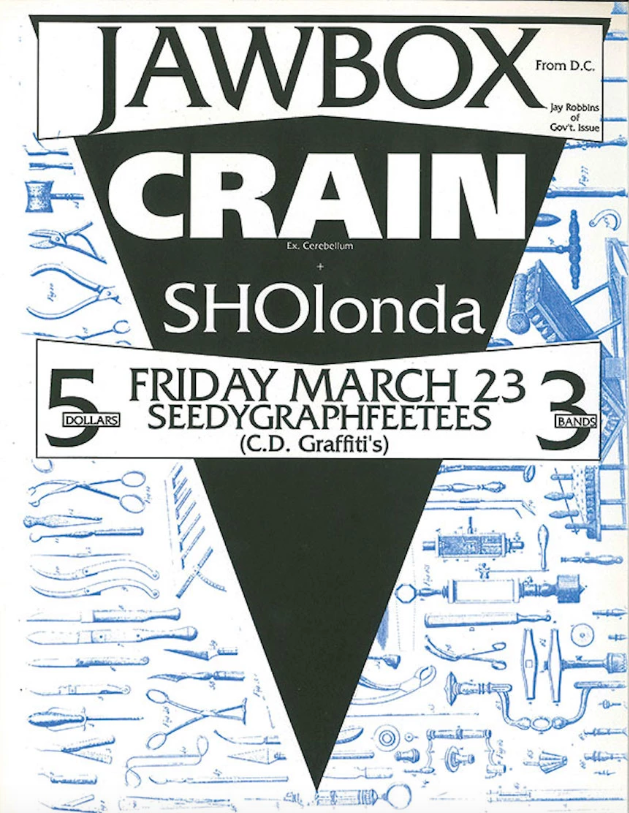From boiling brains to the printed page, from telephone poles to bedroom walls to basement boxes to U-Hauls to curbside piles and into the unknown. The life of a punk rock flyer, like a punk rock song, is short but it is dense. The visual equivalent of a sonic boom. A solar flare. And it often ends abruptly, unceremoniously, dissolved by the rain or simply hidden beneath another.
In Louisville, in the 1980s, there was this old guy that hated flyers. Just hated them. And you'd see him trudging down Bardstown Road ripping them from their staples like a psycho.
Even today, word is that the Jefferson County PVA likes to get up early on Saturday mornings and yank down flyers on the very same strip. It's like yoga to him. Invigorating.

Truth is flyering was never really permitted in Louisville. But it was tolerated as a fact of pre-Internet city life. For many, it was more than tolerated. It was appreciated as an artform unto itself, a DIY tribute to a vibrant music community that spanned the Commonwealth.
With an idea from Cameron Deeb, editors Stephen Driesler,
Shawn Severs, Doug Maxson, Mike Bucayu, Tim Furnish and the late John Kampschaefer wanted to preserve that artform as best they could by piecing together the most comprehensive collection of Kentucky punk rock flyers ever assembled.
The result, recently published by Drag City Records, is White Glove Test, a tome of original flyers produced in Louisville between 1978 and 1994. The title comes from a song by The Endtables, one of the Derby City's first and finest punk bands.
"We felt like our story was everyone's story," says Driesler. "Anybody can see, in this book, their own community reflected."
It's "social history" in that regard, he says, because not everybody playing music in Louisville was born there. They migrated from small Kentucky towns for the chance to play more often and in front of bigger crowds at spots like Tewligans.
There was also a strong Louisville-Lexington connection, particularly in the 1980s. There might be a Lexington band like Active Ingredients on the bill, for example, or the show might be at a Lexington venue like Club Au Go Go or Café LMNOP. Or a touring band like DOA might do a show in some weird Fayette County barn.
Of course there was The Jockey Club in Newport. All the punk rockers would stop there, giving Kentucky bands the chance to open for the likes of Black Flag, The Meat Puppets, Hüsker Dü, Minor Threat and others.
They left a trail of flyers in their wake.
"The book really is about much more than Louisville," says Driesler. "It tells the whole expansive story of Kentucky punk rock through this medium that we've been calling 'teenage folk art'."
For the project, the editors collected and digitized over 1500 flyers from sources across the country. 700 made it into the book based on the strength and originality of their design.

"I think the best ones have a confidence that makes them great. Like a child's art. There's no second guessing. I think that really comes through in the flyers and gives them their power and their charm."
There's also a democratic aspect to the flyers preserved in White Glove Test. They were often made without asking for or receiving permission. They were made by fans, by band members, art schoolers and amateurs alike. They are a testament to creativity and ingenuity. There's the ironic commandeering of newspaper headlines. The cut-and-paste ransom note style. The hand-drawn maps from an era without apps to guide you.

"One of the strengths of the Louisville music community has always been that no band ever wants to sound like any other band in town. Everybody wants to make their own sound. And I think you see that in the flyers as well," says Driesler. "People here seem to almost instinctively want to come up with their own visual style. And I think the best ones did it. Their flyers are as distinct as their sound."The book's editors also felt it was important to tell the story chronologically so that readers can see the way bands gave rise to other bands and the way flyer style evolved over time with the help of technology.
For them, 1994 seemed like a natural cutoff. Some iconic bands were calling it a day. Desktop publishing had taken some of the craftsmanship out of flyer design. Things were fine but they weren't the same.
These days, flyering is a ticketable offense in Louisville and a lot of other places. If the cops see a flyer it's not uncommon for them to show up at the advertised venue to find out who's responsible, track the guilty party down and make them pay up.Bands and fans still make flyers. They just aren't really part of any sort of public discourse. They're hanging in designated areas inside coffee shops and bars and the clubs themselves. They're more like souvenirs.
They're nice. They're nostalgic. But do they pass the test?

White Glove Test is available for purchase online and at these fine area retailers:
Louisville, KY: Astro Black Records, Better Days Records, Carmichael's Bookstore, Guestroom Records, Kentucky Museum of Art and Craft, Modern Cult Records, WHY Louisville.
Lexington, KY: CD Central
Bowling Green, KY: Mellow Matt's Music & More
Cincinnati, OH: Shake It Records
Akron, OH: Square Records
Nashville, TN: Grimey's
Bloomington, IN: Landlocked Music
Indianapolis, IN: Luna Music


